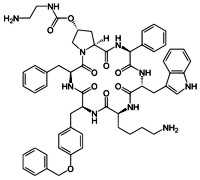The Management of Gastroenteropancreatic Neuroendocrine Tumors with Somatostatin Analogues
Abstract
Gastroenteropancreatic neuroendocrine tumors are a heterogeneous group of malignancies, characterized by varying degrees of biological activity and metastatic potential. A common thread between this wide mix of neoplasms has remained their sensitivity to hormonal modulation with somatostatin analogues. New analogues of somatostatin have been recently introduced and are beginning to shape a different picture of how we treat and monitor for response in patients with gastroenteropancreatic neuroendocrine tumors. Here we discuss three important abstracts presented at the annual meeting of the American Society for Clinical Oncology (ASCO) 2014 (#4107, #4108, and #4111) that highlight the changing landscape of somatostatin-based therapy.
Image: Pasireotide
Downloads
References
Grothey A. Gastrointestinal Cancers. ASCO-SEP. 3rd ed. Alexandria: American Society of Clinical Oncology, 2013.
Khagi S, Saif MW. Gastroenteropancreatic Neuroendocrine Tumors: Hormonal Treatment Updates. JOP. J Pancreas (Online) 2014; 15(2):135-137. [PMID:24618437]
Rubin J, Ajani J, Schirmer W, Venook AP, Bukowski R, Pommier R, Saltz L, Dandona P, Anthony L. Octreotide acetate long-acting formulation versus open-label subcutaneous octreotide acetate in malignant carcinoid syndrome. J Clin Oncol. 1999; 17(2):600 [PMID:10080605]
Rinke A, Müller HH, Schade-Brittinger C, Klose KJ, Barth P, Wied M, Mayer C, Aminossadati B, Pape UF, Bläker M, Harder J, Arnold C, Gress T, Arnold R, PROMID Study Group. Placebo-controlled, double-blind, prospective, randomized study on the effect of octreotide LAR in the control of tumor growth in patients with metastatic neuroendocrine midgut tumors: a report from the PROMID Study Group. J Clin Oncol. 2009; 27(28):4656. [PMID:19704057]
Arnold R, Wittenberg M, Rinke A, Schade-Brittinger C, Aminossadati B, Ronicke E, Gress TM, Mueller HH, PROMID Study Group. Placebo controlled, double blind, prospective, randomized study on the effect of octreotide LAR in the control of tumor growth in patients with metastatic neuroendocrine midgut tumors (PROMID): Results on long-term survival. ASCO 2013; Abstract No: # 4030.
Yao JC, Shah MH, Ito T, Bohas CL, Wolin EM, Van Cutsem E, Hobday TJ, Okusaka T, Capdevila J, de Vries EG, Tomassetti P, Pavel ME, Hoosen S, Haas T, Lincy J, Lebwohl D,Öberg. RAD001 in Advanced Neuroendocrine Tumors, Third Trial (RADIANT-3) Study Group. Everolimus for advanced pancreatic neuroendocrine tumors. N Engl J Med. 2011; 364(6):514. [PMID 21306238]
Pavel ME, Hainsworth JD, Baudin E, Peeters M, Hörsch D, Winkler RE, Klimovsky J, Lebwohl D, Jehl V, Wolin EM, Oberg K, Van Cutsem E, Yao JC. RADIANT-2 Study Group. Everolimus plus octreotide long-acting repeatable for the treatment of advanced neuroendocrine tumours associated with carcinoid syndrome (RADIANT-2): a randomised, placebo-controlled, phase 3 study. Lancet. 2011; 378(9808):2005. [PMID 22119496]
Castellano D, Bajetta, Panneersalvam A, Saletan S, Kocha W, O’Dorisio T, Anthony LB, Hobday T; RADIANT-2 Study Group. Everolimus plus octreotide long-acting repeatable in patients with colorectal neuroendocrine tumors: a subgroup analysis of the phase III RADIANT-2 study. Oncologist. 2013; 18(1):46-53. [[PMID:23263288]
Wolin EM, Jarzab B, Eriksson B, Walter T, Toumpanakis C, Morse M, Tomassetti P, et al. A multicenter, randomized, blinded, phase III study of pasireotide LAR versus octreotide LAR in patients with metastatic neuroendocrine tumors (NET) with disease-related symptoms inadequately controlled by somatostatin analogs. ASCO 2013; Abstract No: # 4031.
Vinik A, Wolin EM, Audry H, Gomez-Panzani EL. ELECT: A Phase 3 study of efficacy and safety of lanreotide autogel/depot (LAN) treatment for carcinoid syndrome in patients with neuroendocrine tumors (NETs). GI Cancers Symposium 2014; Abstract No: #268.
Caplin M, Ruszniewski P, Pavel M, Cwikla J, Phan A, Raderer M, Sedlackova E, Cadiot G, Wall L, Rinidi G, Liyanage N, Blumberg J. A Randomized, double-blind, placebo-controlled study of lanreotide antiproliferative response in patients with gastroenteropancreatic neuroendocrine tumors (CLARINET). The European Cancer Congress 2013; Abstract No: #3.
Lau SC, Cheung WY. The association between octreotide dose and tumor control in gastroenteropancreatic neuroendocrine tumors. ASCO 2014; Abstract No: #4108.
Ruszneiwski PB, Caplin ME, Valle JW, Lombard-Bohas C, Poston GJ, Perros P, Holubec L, Fave GD, Smith DM, Niccoli P, Maisonobe P, Atlan P. Lanreotide autogel/depot treatment for carcinoid syndrome symptoms: Patient reported outcomes from the SYMNET study. ASCO 2014; Abstract No: #4111.
Caplin ME, Ruszniewski PB, Pavel ME, Cwikla JB, Phan AT, Raderer M, Sedlackova E, Cadiot G, Wall L, Rindi G, Langley A, Blumberg J, CLARINET Study Group. Progression free survival with lanreotide autogel/depot in enteropancreatic NETs patients: The CLARINET extension study. ASCO 2014; Abstract No: #4107.
Octreotide, pasireotide. http://www.drugbank.ca/drugs/ accessed June 11, 2014.
Lanreotide. http://dailymed.nlm.nih.gov/dailymed/lookup.cfm accessed June 11, 2014.

Copyright (c) 2014 Simon Khagi, Muhammad Wasif Saif

This work is licensed under a Creative Commons Attribution 4.0 International License.
As a member of Publisher International Linking Association, PILA, iMedPub Group’s JOP follows the Creative Commons Attribution License and Scholars Open Access publishing policies. Journal of the Pancreas is the Council Contributor Member of Council of Science Editors (CSE) and following the CSE slogan Education, Ethics, and Evidence for Editors.